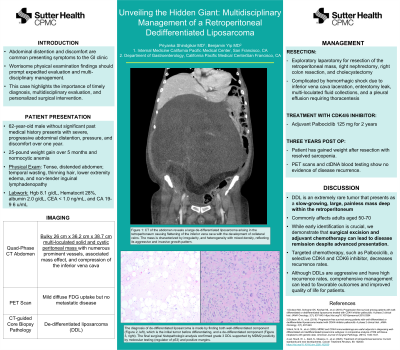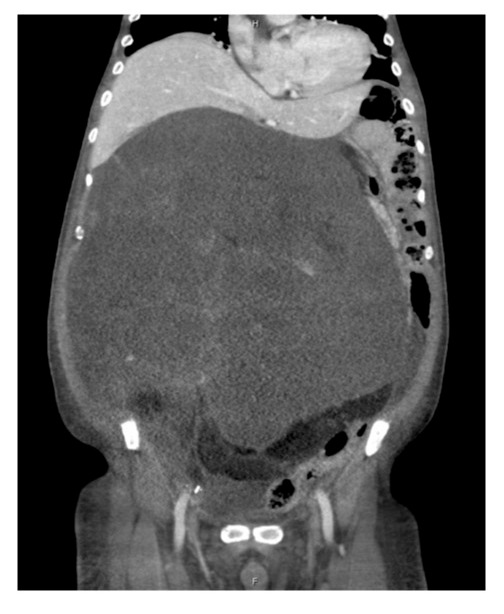Tuesday Poster Session
Category: Colon
P3714 - Unveiling the Hidden Giant: Multidisciplinary Management of a Retroperitoneal Dedifferentiated Liposarcoma
Tuesday, October 29, 2024
10:30 AM - 4:00 PM ET
Location: Exhibit Hall E

Has Audio

Priyanka Shindgikar, MD
California Pacific Medical Center
San Francisco, CA
Presenting Author(s)
Priyanka Shindgikar, MD, Benjamin Yip, MD
California Pacific Medical Center, San Francisco, CA
Introduction: Abdominal distention and discomfort are common presenting symptoms to the GI clinic. Soft tissue sarcomas are a rare cause of a large retroperitoneal mass, and worrisome physical examination findings should prompt expedited evaluation and multi-disciplinary management.
Case Description/Methods: A 62-year-old male with no past medical history presented with severe, progressive abdominal distention, pressure, and discomfort over one year. He had a 25-pound weight gain over 5 months and normocytic anemia. Physical exam revealed a tense, distended abdomen, temporal wasting, thinning hair, lower extremity edema, and non-tender inguinal lymphadenopathy. Initial labs were notable for Hgb 8.1 g/dL, Hematocrit 28%, albumin 2.0 g/dL, CEA < 1.0 ng/mL, and CA 19-9 6 u/mL. A quad-phase abdominal CT scan showed a bulky 26 cm x 36.2 cm x 38.7 cm multi-loculated solid and cystic peritoneal mass with numerous prominent vessels, associated mass effect, and compression of the inferior vena cava. PET scan showed mild diffuse FDG uptake but no metastatic disease. CT-guided core biopsy showed de-differentiated liposarcoma (DDL). The patient underwent exploratory laparotomy for resection of the retroperitoneal mass, right nephrectomy, right colon resection, and cholecystectomy. Peri and post-operative course was complicated by hemorrhagic shock due to inferior vena cava laceration, enterotomy leak, multi-loculated fluid collections, and a pleural effusion requiring thoracentesis. The final surgical histopathologic analysis confirmed grade 3 DDL supported by MDM2 positivity by molecular testing (regulator of p53) and positive margins. He responded well to adjuvant Palbociclib 125 mg for 2 years. At three years post-resection, he has gained weight with resolved sarcopenia. PET scans and ctDNA blood testing show no evidence of disease recurrence.
Discussion: DDL is an extremely rare tumor that presents as a slow-growing, large, painless mass deep within the retroperitoneum and commonly affects adults aged 50-70. This case highlights the importance of timely diagnosis, multidisciplinary evaluation, and personalized surgical intervention. While early identification is crucial, we demonstrate that surgical excision and adjuvant chemotherapy can lead to disease remission despite advanced presentation. Although DDLs are aggressive and have high recurrence rates, comprehensive management can lead to favorable outcomes and improved quality of life for patients.

Disclosures:
Priyanka Shindgikar, MD, Benjamin Yip, MD. P3714 - Unveiling the Hidden Giant: Multidisciplinary Management of a Retroperitoneal Dedifferentiated Liposarcoma, ACG 2024 Annual Scientific Meeting Abstracts. Philadelphia, PA: American College of Gastroenterology.
California Pacific Medical Center, San Francisco, CA
Introduction: Abdominal distention and discomfort are common presenting symptoms to the GI clinic. Soft tissue sarcomas are a rare cause of a large retroperitoneal mass, and worrisome physical examination findings should prompt expedited evaluation and multi-disciplinary management.
Case Description/Methods: A 62-year-old male with no past medical history presented with severe, progressive abdominal distention, pressure, and discomfort over one year. He had a 25-pound weight gain over 5 months and normocytic anemia. Physical exam revealed a tense, distended abdomen, temporal wasting, thinning hair, lower extremity edema, and non-tender inguinal lymphadenopathy. Initial labs were notable for Hgb 8.1 g/dL, Hematocrit 28%, albumin 2.0 g/dL, CEA < 1.0 ng/mL, and CA 19-9 6 u/mL. A quad-phase abdominal CT scan showed a bulky 26 cm x 36.2 cm x 38.7 cm multi-loculated solid and cystic peritoneal mass with numerous prominent vessels, associated mass effect, and compression of the inferior vena cava. PET scan showed mild diffuse FDG uptake but no metastatic disease. CT-guided core biopsy showed de-differentiated liposarcoma (DDL). The patient underwent exploratory laparotomy for resection of the retroperitoneal mass, right nephrectomy, right colon resection, and cholecystectomy. Peri and post-operative course was complicated by hemorrhagic shock due to inferior vena cava laceration, enterotomy leak, multi-loculated fluid collections, and a pleural effusion requiring thoracentesis. The final surgical histopathologic analysis confirmed grade 3 DDL supported by MDM2 positivity by molecular testing (regulator of p53) and positive margins. He responded well to adjuvant Palbociclib 125 mg for 2 years. At three years post-resection, he has gained weight with resolved sarcopenia. PET scans and ctDNA blood testing show no evidence of disease recurrence.
Discussion: DDL is an extremely rare tumor that presents as a slow-growing, large, painless mass deep within the retroperitoneum and commonly affects adults aged 50-70. This case highlights the importance of timely diagnosis, multidisciplinary evaluation, and personalized surgical intervention. While early identification is crucial, we demonstrate that surgical excision and adjuvant chemotherapy can lead to disease remission despite advanced presentation. Although DDLs are aggressive and have high recurrence rates, comprehensive management can lead to favorable outcomes and improved quality of life for patients.

Figure: CT of the abdomen reveals a large de-differentiated liposarcoma arising in the retroperitoneum causing flattening of the inferior vena cava with the development of collateral veins. The mass is characterized by irregularity, and heterogeneity with mixed density, reflecting its aggressive and invasive growth pattern.
Disclosures:
Priyanka Shindgikar indicated no relevant financial relationships.
Benjamin Yip indicated no relevant financial relationships.
Priyanka Shindgikar, MD, Benjamin Yip, MD. P3714 - Unveiling the Hidden Giant: Multidisciplinary Management of a Retroperitoneal Dedifferentiated Liposarcoma, ACG 2024 Annual Scientific Meeting Abstracts. Philadelphia, PA: American College of Gastroenterology.
